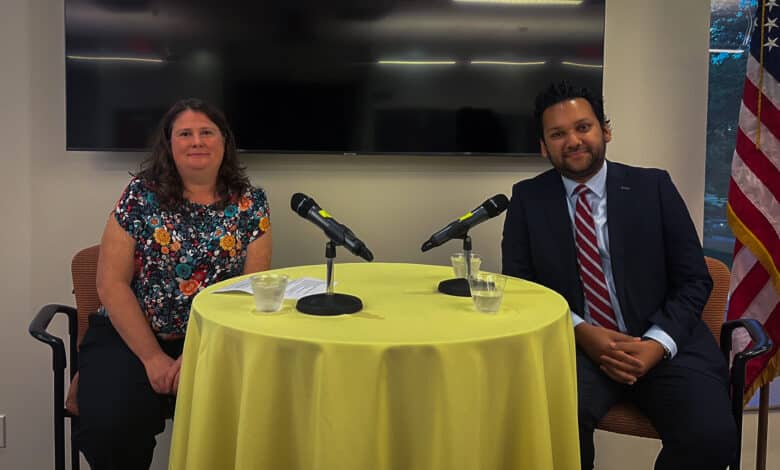
ACLU director talks constitutional rights at Rebovich event
By Caroline Haviland
Amol Sinha welcomed a crowd of about 50 people with a bright smile on his face as guests helped themselves to hors d’oeuvres outside of Lynch Adler Hall Room 202 on Sept. 18. They all came to hear Sinha address a topic he is well-versed in: constitutional rights.
As guests filed in to find their seats, Micah Rasmussen, director of the Rebovich Institute for New Jersey Politics, presented Olivia Newman, chair of the government, politics and law department as the moderator for the evening.
Newman introduced Sinha as the executive director of New Jersey’s American Civil Liberties Union, a nonprofit, multi-issue and multi-faceted organization that focuses on defending and expanding constitutional rights.
“[The ACLU] wants to make sure we’re not just changing laws and policies but also changing the views of people to be a more expansive and inclusive democracy,” said Sinha.
As a nationally recognized civil rights leader, Sinha has spent his career advancing racial justice, holding institutions accountable and defending rights and liberties, according to the ACLU’s website. Sinha also worked as a state policy advocate at the Innocence Project, a national organization that works to improve the criminal justice system.
Presidential election concerns
Many of the issues Sinha touched upon in relation to the upcoming presidential election include abortion access, immigration, the criminal justice system and affirmative action.
Newman dove right in, asking the honorary guest what issues he and the ACLU are watching carefully. Sinha responded with a chuckle, saying, “Democracy.”
Sinha labeled immigration as the dominant conversation of this election season. He pointed out that the ACLU pushed back against family separation policies during the Trump administration and they anticipate worse in this “go-around.”
“In either administration, the work is going to be there to make sure we are keeping families together and treating people humanely,” said Sinha.
Despite immigration being almost solely controlled by the federal government, Sinha explained that people at the state level can have a role in the tone setting for immigration, calling New Jersey one of the most welcoming states in the country.
The ACLU affiliate in New Jersey played a major role in sounding the alarms for state legislation to protect abortion rights, allowing New Jersey to have one of the best abortion protections in the country. However, this was not codified until months before Roe v. Wade was overturned in 2022.
“Initially, [the law] said ‘abortion is a fundamental right for any resident in New Jersey.’ We changed that language to say, ‘anybody present in New Jersey,’ And I hope folks can appreciate the difference there,” said Sinha. “This means anyone out of state is just as entitled to have an abortion as anyone living here.”
Concerns close to home
Halfway through the evening, Newman switched gears and brought up the concerns related to freedom of speech on college campuses. Sinha responded, “How do we do that? Don’t call the police on your students.”
He mentioned the administration at Columbia University from this past school year and its response to the protests that flooded its campus.
“I think college campuses have a unique responsibility to foster dialogue and academic freedom, and any time you say this amount of speech is not welcome here, you’re causing active harm,” said Sinha.
As a non-partisan organization, the ACLU has a long history of protecting the rights of speakers from all political backgrounds, even if it does not agree with their beliefs. Sinha added that people in power cannot decide who can practice their first amendment rights or not.
Newman added on to his point, saying, “I think one of the things I’ve seen people struggle with is the degree of really holding on to the first amendment, which means supporting speech even if it’s reprehensible.”
The evening closed out with the floor open to any questions from the audience, which included a wide variety of topics from gun rights to the criminal justice system.
Following the closing questions of the evening, Sinha gave a final remark: “It wasn’t that long ago that same sex marriage was illegal in the United States, but here we are. You would be hard-pressed to find people that disagree with the notion that people in same-sex relationships should be able to get married. It takes time for the law to catch up to the will of the people. So hopefully we’ll soon see a more compassionate world.”


